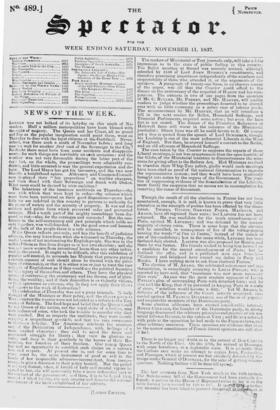Though the result of all the elections in France has
not beea ascertained, enough, it is said, is known to prove that very little alteration in the strength of parties has been effected by the disso- lution. TRIERS, GUIZOT, GARNIER PAGES, MAUGCIN, Ina ARAGO, have all regained their seats ; but Leerrre has not been returned. He was candidate for the tenth arrondissement of Paris, against M. LEFEBRE; and was defeated by the narrow majority of eleven votes. There is some hope that the eleetioa will be annulled, in consequence of five of the voting-papers bearing the words " ni Fun ni Fautre," instead of the names of one of the candidates ; but in the mean while, LEFEHRE has been declared duly elected. LAFITTE was also proposed for Rouiin, and there he was beaten. his friends wished to bring him forward as a candidate for the second arrondiesement of Paris; but lie declined the offer, and in a published note says hitteidy- " Calumny and falsehood have caused my defeat in Paris ael Rollin. I have nothing more to ask from electoral France.- The election of M. AR AGO, the celebrated astronomer and me- thematician, is exceedingly annoying to Louts PHILIP; Wil.) is reported to have said, that "resistance was now more neceeeiry than ever." ARAGO was the most resolute opponent of Louis Plitete's plan of surrounding Paris with detached forts ; and he also told the King, that if he persisted in keeping Paris in a state of siege, " rebellion would become a duty." Yet M. ARAGO, in defiance of the influence of the Court, actively employed. suc- ceeded against M. FRANC Is Ds:Lessem', one of the ni.,et popuLle and respectable members of the Doctrinaire party.
Some election addresses have excited considerable interest. ROYER COLLARD, the founder of the Doctrinaire party, ill strong language denounced the arbitrary principles and practice ot his no- minal follower Gu me, to the voters at Vary ; and DUPt N referred with pride to the opposition he had made to the FIESCII I laws, and other arbitrary measures. These speeches are evidence that even by the narrow constituency of France liberal opinions are still cite- ri he 1.


























